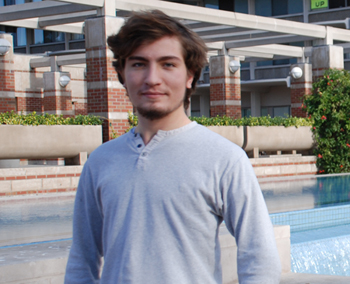
Alessandro Marazzi Sassoon
For Alessandro Marazzi Sassoon, last summer’s Problems Without Passports trip to Rwanda was an opportunity to take the study of post-genocide society one step further.
Sassoon ’14 is an international relations major at the University of Southern California, concentrating on foreign policy analysis and security studies. After growing up in New York and Paris and completing a study abroad trip to Sweden, Finland and Russia, Sassoon was excited to visit central Africa for the first time.
The Problems Without Passports Rwanda course was led by USC Shoah Foundation’s Dan Leshem, associate director of research, and Amy Carnes, associate director of education. Students studied the 1994 Rwandan Tutsi Genocide and its aftermath; during their two weeks in Rwanda, they visited genocide memorials, met with policymakers and other dignitaries, and completed their own research projects about genocide remembrance and prevention.
Sassoon said that in his study of how Rwanda can rebuild its institutions after the genocide, he discovered a piece of Rwanda’s story that isn’t often reported on: the role of conflict minerals in its economic recovery.
“In part Rwanda has been able to recover economically by being one of several middle steps in the trade of minerals from the Congo to mineral refineries Europe, Asia, and Australia, ” Sassoon said.
While being part of the conflict mineral trade has boosted Rwanda’s recovering economy, it has also affected Rwanda’s relationship with Western nations, and the foreign aid it could receive from those countries, that condemn Rwanda’s disputed role in the conflict.
Sassoon produced a short video about Rwanda’s conflict mineral trade, “Explaining the Kivu Conflict,” for Glimpse from the Globe, the blog of the Southern California International Review (SCIR). SCIR is a student-run international relations journal that features articles about world issues and politics.
“I thought, here’s a conflict that people dismiss as impossible to understand. Someone’s got to try to explain it,” Sassoon said. It’s the first time Glimpse from the Globe has produced a video report, he said.
Being in Rwanda on Problems Without Passports showed him a side of Africa he never would have understood by simply studying the issues at home, Sassoon said.
“The realities are never as simple as something you could write,” he said.
A two-day trip to a resort on Lake Kivu, which is on the border between Rwanda and the Democratic Republic of Congo (the most dangerous country in Africa), was especially moving.
“I thought, ‘Wow, this is so peaceful. But actually this is the closest we’re going to get to the war, which is on the other side of the lake,’” Sassoon said. “This lake is just as contentious a border as the one dividing South Korea and North Korea. It was an emotional realization, that I’m in Rwanda, it’s a nice country, but it doesn’t mean that the conflicts are over.”